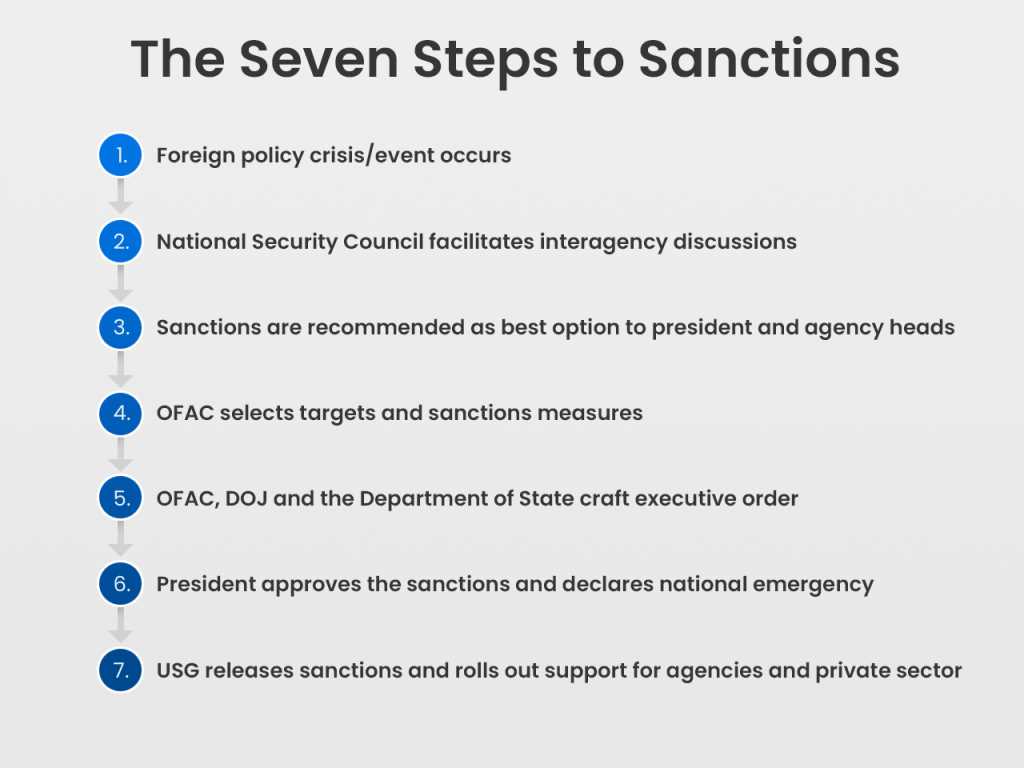Trade Sanctions: Definition, Purpose, Types and Examples
Trade sanctions are economic measures imposed by one country or group of countries on another country in order to restrict or limit trade activities. These measures are often used as a tool of foreign policy to influence the behavior of a targeted country or to address specific concerns such as human rights violations, nuclear proliferation, or unfair trade practices.
The purpose of trade sanctions is to exert pressure on the targeted country to change its policies or behavior. They can be used to discourage certain actions, such as supporting terrorism or violating international agreements, or to promote desired outcomes, such as improving human rights or reducing weapons proliferation.
There are several types of trade sanctions that can be imposed. Economic sanctions involve restrictions on trade, investment, or financial transactions with the targeted country. These can include bans on imports or exports, freezing of assets, or restrictions on access to international financial markets. Diplomatic sanctions involve the suspension or downgrading of diplomatic relations, such as recalling ambassadors or closing embassies. Military sanctions involve the use of military force or the threat of military action to achieve political or economic objectives.
Examples of trade sanctions include the United Nations sanctions on North Korea, which aim to pressure the country to abandon its nuclear weapons program. The European Union has also imposed sanctions on Russia in response to its actions in Ukraine, including restrictions on trade and investment. The United States has used trade sanctions against countries such as Iran and Cuba to address concerns about terrorism and human rights violations.
| Type of Trade Sanctions | Definition | Example |
|---|---|---|
| Economic Sanctions | Restrictions on trade, investment, or financial transactions | United Nations sanctions on North Korea |
| Diplomatic Sanctions | Suspension or downgrading of diplomatic relations | European Union sanctions on Russia |
| Military Sanctions | Use of military force or threat of military action | United States sanctions on Iran and Cuba |
What are Trade Sanctions?
Trade sanctions are a form of economic punishment imposed by one country or group of countries on another country or group of countries. They are often used as a tool of foreign policy to influence the behavior of a targeted country or to address specific concerns such as human rights violations, nuclear proliferation, or unfair trade practices.
The primary objective of trade sanctions is to exert pressure on the targeted country or countries to change their policies or behavior. By restricting trade and economic activities, sanctions aim to create economic hardship and disrupt the targeted country’s economy. This can lead to political instability, social unrest, and ultimately force the targeted country to comply with the demands of the sanctioning countries.
Trade sanctions can have significant impacts on both the targeted country and the countries imposing the sanctions. The targeted country may experience a decline in economic growth, higher inflation, unemployment, and reduced access to essential goods and services. On the other hand, the countries imposing the sanctions may face economic losses due to reduced trade opportunities and potential retaliation from the targeted country or its allies.
The Purpose of Trade Sanctions
Trade sanctions are economic measures imposed by one country or a group of countries on another country in order to achieve specific political or economic goals. The purpose of trade sanctions can vary depending on the circumstances and the objectives of the imposing country or countries. Generally, trade sanctions are implemented as a means of exerting pressure or influence on the target country to change its behavior or policies.
Political Objectives

One of the main purposes of trade sanctions is to promote political change in the target country. By imposing trade restrictions, the imposing country or countries aim to put pressure on the target country’s government to alter its policies, such as human rights abuses, nuclear proliferation, or support for terrorism. The hope is that the economic impact of the sanctions will force the target country to reconsider its actions and make the desired political changes.
Economic Objectives
Trade sanctions can also be used to achieve economic goals. For example, a country may impose sanctions on another country to protect its domestic industries from unfair competition or to address trade imbalances. By restricting trade with the target country, the imposing country aims to create a more level playing field for its own industries and promote economic growth and stability.
In some cases, trade sanctions may be imposed as a response to unfair trade practices, such as intellectual property theft or currency manipulation. By imposing sanctions, the imposing country seeks to address these issues and protect its own economic interests.
Deterrence and Signaling
Trade sanctions can also serve as a deterrent and a signaling mechanism. By imposing sanctions on a country, the imposing country or countries send a clear message that certain actions or behaviors will not be tolerated. This can serve as a warning to other countries that similar actions will result in similar consequences.
Furthermore, trade sanctions can be used as a way to signal disapproval or disagreement with a country’s policies or actions. By imposing economic restrictions, the imposing country or countries express their dissatisfaction and seek to isolate the target country diplomatically.
Types of Trade Sanctions
Trade sanctions can take various forms depending on the goals and objectives of the imposing country or international organization. Here are some of the most common types of trade sanctions:
1. Embargoes
An embargo is a complete ban on trade with a specific country or region. It prohibits the import, export, or any other form of trade, including financial transactions. Embargoes are usually imposed for political reasons, such as human rights violations, nuclear proliferation, or support for terrorism.
2. Tariffs and Import Quotas
Tariffs and import quotas are trade sanctions that involve imposing additional costs or restrictions on imported goods. Tariffs are taxes or duties imposed on imported goods, making them more expensive and less competitive in the domestic market. Import quotas, on the other hand, limit the quantity of specific goods that can be imported into a country.
3. Export Controls
Export controls restrict the export of certain goods or technologies to specific countries or regions. These controls are often implemented to prevent the proliferation of weapons of mass destruction, protect national security, or maintain a technological advantage.
4. Financial and Banking Restrictions

Financial and banking restrictions involve limiting or prohibiting financial transactions with a targeted country or its entities. This can include freezing assets, restricting access to international banking systems, or prohibiting certain types of financial services.
5. Travel Bans and Visa Restrictions
Travel bans and visa restrictions are trade sanctions that limit the movement of individuals associated with a targeted country or government. These measures can include denying entry visas, revoking existing visas, or imposing travel bans on specific individuals.
6. Arms Embargoes
Arms embargoes are trade sanctions that restrict the export or import of weapons and military equipment to a specific country or region. These sanctions aim to prevent the escalation of conflicts, protect human rights, and maintain regional stability.
Examples of Trade Sanctions
Trade sanctions are a powerful tool used by governments to influence the behavior of other countries. They can be imposed for various reasons, such as national security concerns, human rights violations, or to address unfair trade practices. Here are some examples of trade sanctions that have been implemented by different countries:
1. United States Sanctions on Iran
One of the most well-known examples of trade sanctions is the United States’ sanctions on Iran. These sanctions were imposed to curb Iran’s nuclear program and prevent it from developing nuclear weapons. The sanctions include restrictions on trade in oil, banking, and other sectors, and have had a significant impact on Iran’s economy.
2. European Union Sanctions on Russia
Following Russia’s annexation of Crimea in 2014, the European Union imposed sanctions on Russia. These sanctions include restrictions on trade in certain sectors, such as energy, defense, and finance. The aim of these sanctions is to put pressure on Russia to change its behavior and respect Ukraine’s sovereignty.
3. United Nations Sanctions on North Korea
The United Nations has imposed multiple rounds of sanctions on North Korea in response to its nuclear weapons program. These sanctions include restrictions on trade in goods and services that could contribute to North Korea’s nuclear program, as well as financial sanctions targeting individuals and entities involved in illicit activities.
4. United States Sanctions on Venezuela
In response to the political and economic crisis in Venezuela, the United States has imposed sanctions on the Venezuelan government. These sanctions include restrictions on trade in oil, financial transactions, and targeted sanctions against individuals involved in human rights abuses and corruption.
5. United Nations Sanctions on Iraq

In the 1990s, the United Nations imposed sanctions on Iraq in response to its invasion of Kuwait. These sanctions included an embargo on trade in oil and other goods, with the aim of pressuring Iraq to comply with UN resolutions and disarm its weapons of mass destruction.
These are just a few examples of trade sanctions that have been implemented by different countries and international organizations. Trade sanctions can have a significant impact on the targeted country’s economy and can be a powerful tool for influencing behavior and promoting international norms and values.

Emily Bibb simplifies finance through bestselling books and articles, bridging complex concepts for everyday understanding. Engaging audiences via social media, she shares insights for financial success. Active in seminars and philanthropy, Bibb aims to create a more financially informed society, driven by her passion for empowering others.
